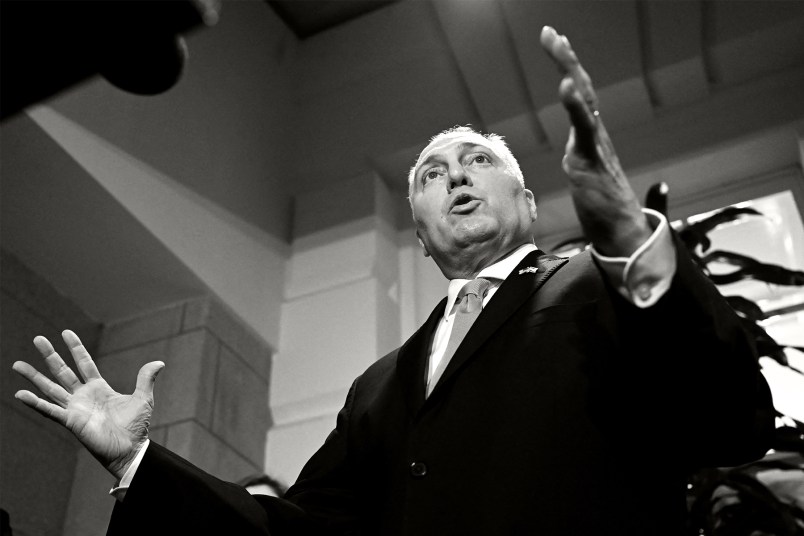Under the exposed pipes in the House basement, emotions ran high as the Republican conference argued with and cajoled each other to try to coalesce behind a new Speaker.
Member after member trickled out of the meeting, expressing frustration and embarrassment as Steve Scalise (R-LA) — the newly minted nominee — seems even further from 217 votes than he did in the immediate aftermath of his selection on Wednesday. The threshold for his nomination was lower, giving him the nod but leaving him short of the votes he’d need to officially win the gavel on the House floor.
Scalise’s unraveling bid has sent Republicans scrambling for some, any, other viable option: nominee runner-up Rep. Jim Jordan (R-OH) or a resurrected Rep. Kevin McCarthy (R-CA) or even Donald Trump.
Ultimately, the personnel details matter less than the mechanics. A Speaker Scalise or Jordan or Trump would face the same sword of Damocles that brought down McCarthy: the motion to vacate and its one-member threshold that triggers a vote on dethroning the speaker. As demonstrated when Rep. Matt Gaetz (R-FL) toppled McCarthy, in a majority with such slim margins, it’s very difficult to avert the handful of defections that can take the speaker down.
Some of the most vocal advocates of raising the threshold to trigger the vote after McCarthy’s deposal didn’t seem optimistic that a rule change would actually manifest in interviews with TPM Thursday.
“In the last week, of course, there’s been a lot of conversations about motion to vacate — that does not appear to be a live issue right now,” Rep. Dusty Johnson (R-SD), chair of the Main Street Caucus which has called for a rule change, told TPM. “I don’t get the sense that there will be a rule proposal brought on the House floor in the short term that would adjust the motion to vacate.”
The rule was not discussed at Thursday’s closed-door meeting, multiple members told TPM, where the focus was on still-elusive “unity” and pulling the conference together.
The current lack of a speaker — Rep. Patrick McHenry (R-NC) is filling in as speaker pro tempore — also makes it difficult for members to condition their speaker votes on a rule change.
Rep. Carlos Giménez (R-FL), an outspoken supporter of raising the threshold, described it to TPM as asking a speaker nominee to “pledge to try to change” the rule, since they can’t take a floor vote on it until the new speaker is installed.
And the same agitators who flexed their muscles by ending McCarthy’s tenure are unlikely to willingly give up such power going forward.
“We all agree to that — that’s kind of, like, universal, except maybe for eight people,” Giménez told TPM of supporting a raised threshold. “But we’re gonna need those eight people who are going to take that motion to the floor to raise the level. We have to unify again, we have to have 217 to get that done. So that’s why no speaker can guarantee that, but we need to get to that — we just can’t have this again.”
If the rule stays as is whenever House Republicans are able to get behind a speaker in sufficient numbers, it’s almost certain to threaten and likely truncate his tenure. The same problems that led to McCarthy’s downfall will plague the new speaker too: Gaetzian members who crave attention and power, periodic, must-pass legislation that has so far only made it through the House with the ever-verboten collaboration with Democrats and an achingly thin majority.
As soon as one member opposes, say, a continuing resolution when the current one runs out in mid-November, the new speaker — if one has been voted in — could be fighting for his political life.
“It’s been weaponized and abused at this point,” Rep. Dan Crenshaw (R-TX) told TPM of the motion to vacate. “Now am I gonna, like, withhold my votes for it? No, not necessarily. I don’t really have that option.”



